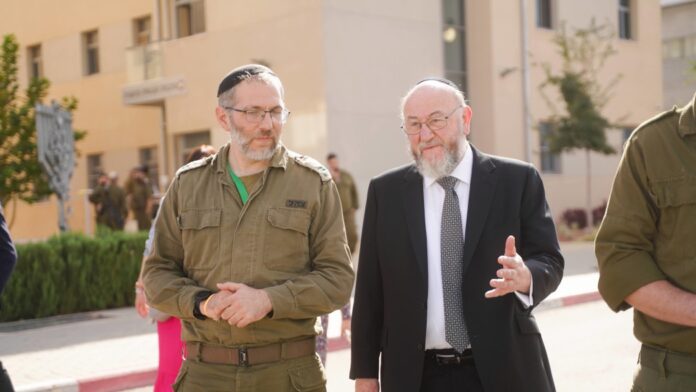
United Synagogue Rabbis, Rebbetzens, and leaders visited Israel last week on a two-day solidarity mission. The group met with the IDF rabbinate, including Rabbi Bentzi Mann, formerly of Mill Hill East Jewish community, Tribe, and JFS. Rabbi Mann and others had to identify hundreds of civilian victims of the October 7 massacre and prepare them for burial.
Jo Grose, the US CEO, said: “As we heard the experiences of Rabbi Mann, I had to remind myself that he wasn’t talking about something which happened in the Shoah but only last month, in contemporary Israel.” Chief Rabbi Ephraim Mirvis reflected that although the base is known as ‘Sha’arei Gehinnom’, the ‘gates of hell’, it should really be known as ‘Sha’arei Shamayim’, the ‘gates to heaven’.
The group accompanied the coffin of a fallen soldier and said kaddish for him. Rabbi Pinchas Hackenbroch of Woodside Park United Synagogue and Chair of the US Rabbinic Council laid a wreath on behalf of the United Synagogue. They visited the graves of dozens of soldiers who have fallen in recent weeks.
Rabbi Barry Lerer of Central Synagogue said: “We were told that some of the bodies were so badly mutilated that they had to be taken to America to be identified, showing how far Israel will go to make sure each body is treated with respect. We also had a positive experience at the army base where we were shown the world’s largest ‘Aron Hakodesh’, a vast warehouse full of Sefer Torahs taken to army units around the country. With 300,000 people called up, you can imagine how many demands there are for a Sefer Torah. In the same place that we saw bodies be prepared for burial, we saw that Judaism, the Jewish people, and Torah live on.”
The group traveled to Netanya to hear harrowing tales from residents of the kibbutzim who survived the massacre and families whose loved ones have been taken hostage. They were struck by their resilience and the support they’re giving one another. Seeing the empty Shabbat table in Hostage Square, Tel Aviv, set for over 240 people was a powerful reminder of how many babies, children, women, and men have been kidnapped by Hamas. Rebbetzen Eva Chapper of Borehamwood and Elstree Synagogue said: “It was extremely distressing. The Shabbat table was so long, and you could feel pain all around you. I left feeling that we have to share these stories and tell the world that these hostages have to come home.”
At United Hatzalah, the group heard accounts of immense bravery. In a Jerusalem hotel, they witnessed the volunteering efforts to build a community of some of the 10,000 people evacuated. Tribe brought together students spending their Gap Year in Israel to meet the Chief Rabbi. The group prayed for the victims of the war and the safe return of hostages at the Western Wall.
Reflecting on the trip, Grose said: “Our visit showed it is still the Israel we know. But this is also a new Israel. While this is a country still in deep grief, our time here revealed a people that is unified, brave, and filled with chesed.”









